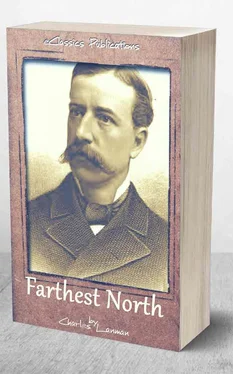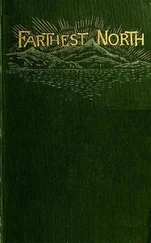Charles Lanman - Farthest North - or, the Life and Explorations of Lieutenant James Booth Lockwood, of the Greely Arctic Expedition
Здесь есть возможность читать онлайн «Charles Lanman - Farthest North - or, the Life and Explorations of Lieutenant James Booth Lockwood, of the Greely Arctic Expedition» — ознакомительный отрывок электронной книги совершенно бесплатно, а после прочтения отрывка купить полную версию. В некоторых случаях можно слушать аудио, скачать через торрент в формате fb2 и присутствует краткое содержание. Жанр: unrecognised, на английском языке. Описание произведения, (предисловие) а так же отзывы посетителей доступны на портале библиотеки ЛибКат.
- Название:Farthest North: or, the Life and Explorations of Lieutenant James Booth Lockwood, of the Greely Arctic Expedition
- Автор:
- Жанр:
- Год:неизвестен
- ISBN:нет данных
- Рейтинг книги:5 / 5. Голосов: 1
-
Избранное:Добавить в избранное
- Отзывы:
-
Ваша оценка:
- 100
- 1
- 2
- 3
- 4
- 5
Farthest North: or, the Life and Explorations of Lieutenant James Booth Lockwood, of the Greely Arctic Expedition: краткое содержание, описание и аннотация
Предлагаем к чтению аннотацию, описание, краткое содержание или предисловие (зависит от того, что написал сам автор книги «Farthest North: or, the Life and Explorations of Lieutenant James Booth Lockwood, of the Greely Arctic Expedition»). Если вы не нашли необходимую информацию о книге — напишите в комментариях, мы постараемся отыскать её.
"Farthest North" by Charles Lanman
Description:
In the 1885 written «Farthest North», Charles Lanman (1819-1895) tells the life story of Lieutenant, and American arctic explorer, James Booth Lockwood, and his deadly participation in the Lady Franklin Bay Expedition, also referred to as the Greely Arctic Expedition.
Farthest North: or, the Life and Explorations of Lieutenant James Booth Lockwood, of the Greely Arctic Expedition — читать онлайн ознакомительный отрывок
Ниже представлен текст книги, разбитый по страницам. Система сохранения места последней прочитанной страницы, позволяет с удобством читать онлайн бесплатно книгу «Farthest North: or, the Life and Explorations of Lieutenant James Booth Lockwood, of the Greely Arctic Expedition», без необходимости каждый раз заново искать на чём Вы остановились. Поставьте закладку, и сможете в любой момент перейти на страницу, на которой закончили чтение.
Интервал:
Закладка:
Remembering what he said about the drinking customs of Omaha, on New-Year’s-day, 1875, it is pleasant to have him record the fact, on the 2d of January, 1876, that “the most noticeable feature during the previous day, in society, was the entire absence, at most houses, of any intoxicating liquors, and that he did not see a case of drunkenness during the entire day—a thing very rare even in the cities of the East.” On a subsequent occasion, he mentions the fact that, when one of his sergeants had been drinking to excess, he put him in arrest, but released him the next day, after warning him of the consequences of a repetition of the offense, and “preaching him a sermon on the evils of intoxication, moral, mental, and physical.” On one occasion, when his father had asked how he spent his leisure time in the barracks, he replied that he read, so as to combine pleasure with profit, played on his flute, and studied the art of short-hand, which had long been a hobby with him, and was to be in the future an important accomplishment. In an effort to read Draper’s “Intellectual Development of Europe,” he could only manage about one half of the work, and to counteract its dullness resorted to a novel, “The Wandering Jew.” As he was frequently called upon to act as recorder of the military court, he found his knowledge of stenography very useful and very much of a relaxation, and, on receiving a letter from one of his sisters which was good but not very plainly written, he said that he had been able to make it out by means of his skill in shorthand writing. As to his studies, he had formed a regular plan for prosecuting them, but was constantly interrupted by extra official duties. Among other things, he devoted himself to the German language, and subsequently to French, and attained considerable proficiency. An idea of his habits of industry may be gathered from what he wrote to his father, when the General was placed on the retired list of the navy: “So you are retired this month. You ought to open an office, or do something to occupy your mind. Every one needs something in the way of business or duty. You will soon get tired of reading continuously.” On the approach of spring, and with the expectation of obtaining a leave of absence during the coming summer, he resumed a discussion with his father about leaving the army for civil employment. He had entered it well posted in regard to its disadvantages, and chiefly for the sake of having something to do. He had now become more deeply impressed than before that promotion was so slow, that his prospects of increased rank and pay offered no inducements to any young man of energy and industry, qualities which he certainly possessed. He was not then ready for decisive action, but he was determined to support himself, and would, therefore, be on the lookout for advantageous prospects in some other line of employment. In one of his letters, after commenting upon the school which two of his sisters were attending, he gives us this bit of experience: “I am a school-teacher myself; my pupils, the non-commissioned officers of the company. They waste the midnight oil, however, only in boning the tactics. I go down and dilate and expatiate very profoundly on the reasons and logic of this and that. This is a pleasant school to have; the authority and influence of the officer have their full weight in the ordinary school-room as elsewhere in the army.” In May, 1876, after giving an account of a proposed demonstration, under General Crook, against the Indians on the Yellowstone, he thus relieves his mind: “Would that I belonged to the cavalry! I like motion, action, and variety. To be sure, I would rather be here (in Omaha) than where the other companies are, but still would rather be in the field than here.” In June, 1876, the monotony of his life was relieved by an order to take some convicts to the State prison near Fort Leavenworth, which he described as the largest post in the country, containing the post proper, the department headquarters, and the military prison. The State prison is about six miles from the town. “Here,” he writes, “are sent all the enlisted men who are dishonorably discharged, convicted of theft, or other not purely military offenses. The inclosure is an immense yard, surrounded by a high stone wall—the building, which is on one side, having an appearance somewhat like the Smithsonian Institution. In the inclosure are various other buildings, each one used as a workshop for some trade, almost all the common trades being represented. The prisoners, numbering about five hundred, are together in the daytime, but not at night, and are not allowed to talk with each other. It was from this prison that the best features of the new military prison were obtained, the board of officers on the management of the prison at Fort Leavenworth having decided it to be the best one to imitate.”
In the autumn of 1876, when he was granted a leave of absence to visit his parents, they found him in personal appearance wonderfully improved and developed, the boy of 1873 having become a handsome and accomplished gentleman. He was not slow, as may be supposed, in making his way to Philadelphia to visit the Centennial Exposition, which he greatly enjoyed.
CHAPTER IV. – ARMY-LIFE IN KANSAS.
During Lieutenant Lockwood’s absence on leave, his regiment was transferred to Fort Leavenworth, and there we find him early in 1877, and for about two years thereafter. Of course, the garrison life of an officer, in times of peace, is somewhat monotonous; but the letters which the lieutenant wrote from this station contain some passages which are interesting and illustrate his character, as will be seen in the following pages. Here it should be stated that, during his sojourn at Fort Leavenworth, he made many pleasant acquaintances, which ripened into friendship; among them being the widow of an officer, with whom he boarded for some time, and whose friendship he particularly valued.
At a time when there was quite a rage at the garrison for private theatricals, one of the superior officers took the liberty, without previous consultation, of putting Lockwood on the list of performers, whereupon he declined the honor, as he thought Nature never intended him for a star. In speaking of a little difficulty between two of his friends, he manifests his love of fun by stating that one of them had denied the allegation and defied the alligator. When commenting upon some disagreeable March weather, he said, “I don’t think the ground-hog has seen his shadow, and hence the latter part of the month ought to be pleasant.” After a remark on the proficiency he was making in the study of French, he quietly continues, “There are many here who speak it ‘à l’Américaine,’ as if they thought that ‘the chief end of man.’”
As if never satisfied with his acquirements, he writes in one of his letters as follows: “My latest hobby is telegraphing. The signal officer of the department has loaned me a small battery and an instrument. We have put up the wires and are progressing well. Telegraphy, like phonography, is easy to transmit after some little practice; but it is difficult to recognize the sounds as they come over the wire, and it requires as much practice as it does to recognize the phonographic characters. I have the instrument on the table before me, and can not fail to gain some proficiency at any rate.”
In July, 1877, when the strikers and rioters were making trouble in St. Louis, Mo., Lieutenant Lockwood’s company and five others were ordered to that city on duty. After their arrival, they waited in daily expectation of mowing down the mob, but there was little fighting, as the police and militia were found to be amply sufficient to subdue all disturbance. He was greatly pleased with the city and military quarters of St. Louis, and felt that he would like to remain there on permanent duty. The feature which pleased him more than any other at St. Louis was a private garden of about fifty acres, exquisitely planned, and containing the rarest and most beautiful flowers and trees. The floral display, there, he thought superior to that at the Centennial Exposition. The owner, a bachelor named Shaw, nearly eighty years of age, and a man of enormous wealth, paid out yearly in expenses twenty-five thousand dollars. At the garden residence of this millionaire, young Lockwood and a friend were hospitably entertained—a wonderful contrast to the accommodations at a beer-saloon, near the arsenal gate, where the army officers were obliged to take their meals while in the city. Altogether the trip was pleasant, but too expensive for men with limited means. On their return to Fort Leavenworth from the Eden-like garden of St. Louis, they were informed of Indian troubles in Montana, and startled by a rumor that they must soon be off upon a hunt for Indians—illustrating the vicissitudes of army-life.
Читать дальшеИнтервал:
Закладка:
Похожие книги на «Farthest North: or, the Life and Explorations of Lieutenant James Booth Lockwood, of the Greely Arctic Expedition»
Представляем Вашему вниманию похожие книги на «Farthest North: or, the Life and Explorations of Lieutenant James Booth Lockwood, of the Greely Arctic Expedition» списком для выбора. Мы отобрали схожую по названию и смыслу литературу в надежде предоставить читателям больше вариантов отыскать новые, интересные, ещё непрочитанные произведения.
Обсуждение, отзывы о книге «Farthest North: or, the Life and Explorations of Lieutenant James Booth Lockwood, of the Greely Arctic Expedition» и просто собственные мнения читателей. Оставьте ваши комментарии, напишите, что Вы думаете о произведении, его смысле или главных героях. Укажите что конкретно понравилось, а что нет, и почему Вы так считаете.












